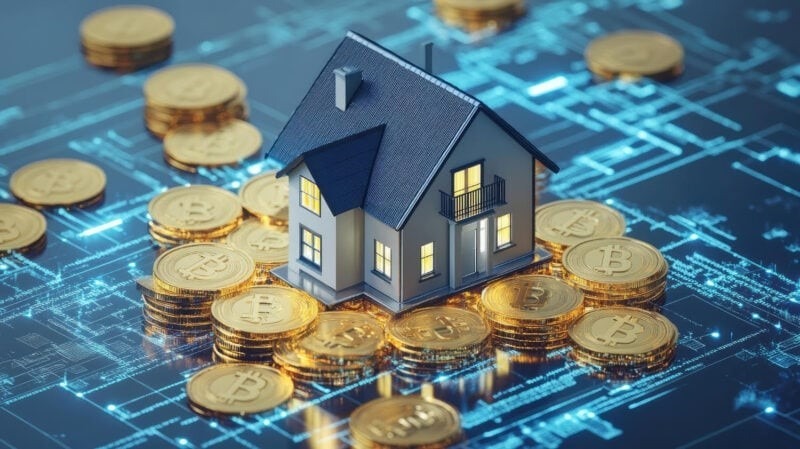Real Estate Tokenization and Fractional Ownership: The Future of Property Investment
For generations, the real estate market has maintained a reputation for requiring large initial capital deposits and involving complex purchase transactions with restricted market flexibility. Today, this is no longer the case, as advancements in Blockchain technology have introduced a new financial system through real estate tokenization and fractional ownership.
These innovations create accessibility, operational efficiency, and greater transparency, which allows investors from various backgrounds to take part in real estate investment.
Now, let’s see how these concepts reshape the industry and what it means for potential investors.
What is Real Estate Tokenization?
Turning real estate property rights into Blockchain-powered digital tokens is the actualization of real estate tokenization. Just like business shares, real estate tokens represent ownership parts of physical properties. Through Blockchain-based platforms, investors can acquire these tokens to perform buying and selling transactions, thus enhancing real estate investment liquidity and accessibility.
Digital assets, through Blockchain provide secure transaction capabilities that eliminate intermediaries while simplifying property investment operations. The system enables more investors to participate in the real estate market through enhanced operating efficiency.
Benefits of Real Estate Tokenization
- Traditional real estate investments are highly illiquid, often requiring months or years to sell. With tokenization, investors can trade fractional ownership stakes in secondary markets. Investors can easily access their funds whenever.
- Tokenization allows investors to buy small shares of valuable properties, making real estate investment possible even with limited capital.
- Blockchain’s decentralized ledger records all transactions, ensuring security and reducing the risk of fraud, hence trust.
- Investors can purchase tokens of properties located anywhere in the world. This widens the scope of property investment horizons and without geographical restrictions.
What is Fractional Ownership?
Fractional ownership of property enables several investors to hold properties in bits by obtaining ownership shares as all investors who own portions of an asset share in property rental profits as well as potential asset gains. Thanks to Blockchain technology, a previously conceived concept that allowed vacation property co-ownership for several years is now more efficient.
The tokenization process removes the prerequisite for convoluted legal documentation and shared cooperative arrangement duties. Through Blockchain-based platforms, investors can make transactions involving their properties easily.
The Pros of Fractional Ownership
- Diversification: Instead of putting all the money in one basket, investors can spread their risk across multiple assets in different locations and property types.
- Flexible Exit Strategies: Investors can sell their shares in a property without waiting for the entire asset to be sold, i.e., more liquidity and flexibility.
- Shared Costs and Maintenance: Property management and maintenance costs are divided among owners, reducing the financial burden on any single investor.
How Does Blockchain Power Tokenization and Fractional Ownership?
Blockchain technology is at the heart of real estate tokenization, providing a secure, transparent, and decentralized system for managing transactions and ownership of digital assets.
Here’s how it works:
- Smart Contracts: These are self-executing contracts that automatically enforce ownership rights, rental payments and revenue distribution.
- Security Tokens: Real estate tokens comply with securities regulations, allowing them to be traded on specialized exchanges.
- Immutable Records: Once a transaction is recorded on the Blockchain, it cannot be altered, thus creating a transparent ownership history.
Tokenized Real Estate Projects
Fractional ownership of the St. Regis Aspen Resort in Colorado is represented by Aspen Digital Tokens, which have proven to be a successful real estate tokenization solution. Investors received digital tokens acting as resort equity ownership for accessing rental pay-outs and future property value increases.
The Future of Real Estate Investment
Integrating real estate tokenization with fractional ownership has done away with traditional barriers that previously limited property market opportunities. These disruptive real estate innovations expand market opportunities for investors who can now enjoy more accessible properties, enhanced portfolio diversification, and better market liquidity.
The increasing adoption of Blockchain will introduce new tokenized real estate investment opportunities, which will build an environment that supports a diverse and efficient investment platform. Tokenized real estate provides the ideal entry point for investment-prudent people who had previously avoided real estate ownership because of high costs and poor liquidation capabilities.
This novel investment model is the industry’s definitive path toward financial freedom and industrial upheaval.
#RealEstateTokenization #FractionalOwnership #SmartContracts #RealEstateInvesting #PropertyInvestment #DigitalAssets #DeFiRealEstate #TokenizedRealEstate #FinancialFreedom #FutureOfRealEstate
Image Source: Adobe Stock
Disclaimer: This article is for informational purposes only and should not be considered legal, tax, investment, or financial advice.

